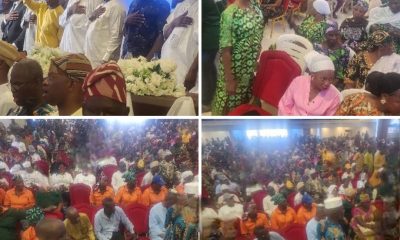Opinion
Bye Bye To Subsidy; Welcome To Reality

By Femi Soneye
One of the most important virtues of leadership is courage. This quality more than any other, will determine whether a leader succeeds or fails in his mission. Whilst vision is important because it outlines and encapsulates a leader’s plan and purpose, it may shipwreck in the stormy sea of public resistance if the leader lacks the courage to push it through. To succeed, a leader must stare down his demons and those of his people as he plods ahead toward his goal.
To give in to fear or to be overawed by the weight of public opinion even when he knows that if he persists in his course society will better for it, is to exhibit the highest form of irresponsibility. At critical moments in a nation’s journey there arises the need for a leader to take decisions, which appearing unpopular to the mass of the people, ultimately end up positively transforming their situation. We are at such a point in our country.
The last eight years have been challenging but for the government and the people. A combination of events on the global scene-the implacable Covid 19 virus, which brought the world to its knees, global recession, and the ongoing Russia-Ukraine war, and some internal challenges like insecurity, oil theft and corruption, left the Nigerian economy reeling.
A key consequence of this was that millions of Nigerians were thrown into poverty with figures from the World Bank showing that a whopping 133 million Nigerians presently live in multidimensional poverty.
The challenges faced by the Nigerian economy by some of the developments mentioned above, were exacerbated by the channeling of trillions of Naira over the last eight years into servicing a regime of subsidy on petrol, which quite frankly, was an exercise in futility because instead of cushioning the effect of the hardship faced by Nigerians through reduction of the cost they pay for premium motor spirit, it ended up enrich a clique of marketers and other individuals operating in the downstream sector of the Nigerian oil and gas sector.
Through this practice, which by the way predated the immediate past government headed by Muhammadu Buhari, the Nigerian government unwittingly enriched these individuals whilst driving ordinary Nigerians deeper into poverty. In the twilight of his tenure, the Buhari government having taken cognizance of negative cost of the subsidy regime to both the economy and Nigerians determined it must be brought to an end.
Consequently, it set June 30, 2023 as the terminal date for its removal. A new government is now in place. In his inaugural address, President Bola Tinubu who heads the new government, informed Nigerians of the development and as is typical of a lot of Nigerians some unpatriotic oil marketers have resorted to hoarding fuel in order to create artificial scarcity and ultimately hike the price of the product. Expectedly, Nigerians are kicking and demanding that subsidy be reinstated.
Labour unions and civil society organizations are threatening mass action among other measures. It’s deja vu all over again. We seem to have retreated eleven years back when the administration of Dr. Goodluck Jonathan on January 1, 2012, removed subsidy on petrol. Then, Nigerians instigated by opposition political parties and civil society organizations through mass rallies, blackmailed the administration into reinstating the removed subsidy.
The Tinubu administration should not fall into that same trap from which the Jonathan administration never recovered. As a leader with a vision to lead Nigeria to prosperity, Dr. Jonathan faltered because he did not have the courage of his convictions.
At the critical moment he ought to exercise leadership, he balked, surrendering the high ground to opponents of his government. It was Franz Fanon the revolutionary writer, psychiatrist and activist who admonished the elite many years ago that their role in society is essentially to bring succour to the people.
He said: “If any philosophy is here being preached, it is that man must not only exist but must live well; the measurement of any intellectual activity being the welfare of the people” Nothing can be more straight- forward about the task before President Tinubu.
As a leader who has traversed the public and private sectors, he understands the necessity of evolving policies and programmes that not only open up the space for enterprise but one that equally ensures that even those without the predilection for engaging in business activities including those at the rung of society’s ladder, feel the impact of government whether in the rural or urban centres.
For someone who came into government on the mantra of renewed hope, he should understand that he owes it to millions of those who voted for him and the millions others who did not but who are citizens of the Federal Republic of Nigeria, to engender a system that enables them to flourish not one that asphyxiates them.
President Tinubu stands at the intersection of history. What he does at this very moment will determine whether he annexes a place in the pantheon of revered Nigerian leaders or he slides quietly into oblivion. Once again, we hear from Fanon who said: “Every generation must out of relative obscurity, seeks to discover its mission and then fulfill it or betray it”.
Will President Tinubu cave in to threats and blackmail and then continue the empowerment of a few unconscionable individual who have for decades become leeches sucking at the soft underbelly of our fragile economy and in the process throwing millions of Nigerians into poverty of the most abject kind or will he take.
-

 Education4 days ago
Education4 days ago2026 UTME: JAMB Rules Out Extension As Registration Ends In 17 days
-

 News3 days ago
News3 days agoOsun 2026: Former SSG Adeoti, Thousand Of Supporters Declare Support For Adeleke
-

 News3 days ago
News3 days agoNigerians Cannot Afford Another Glitch: Fadojoe Insists on Real-Time Electronic Transmission of Election Results
-

 News5 days ago
News5 days agoKwara Killings Expose Nigeria’s Rural Security Collapse – Gbenga Hashim


